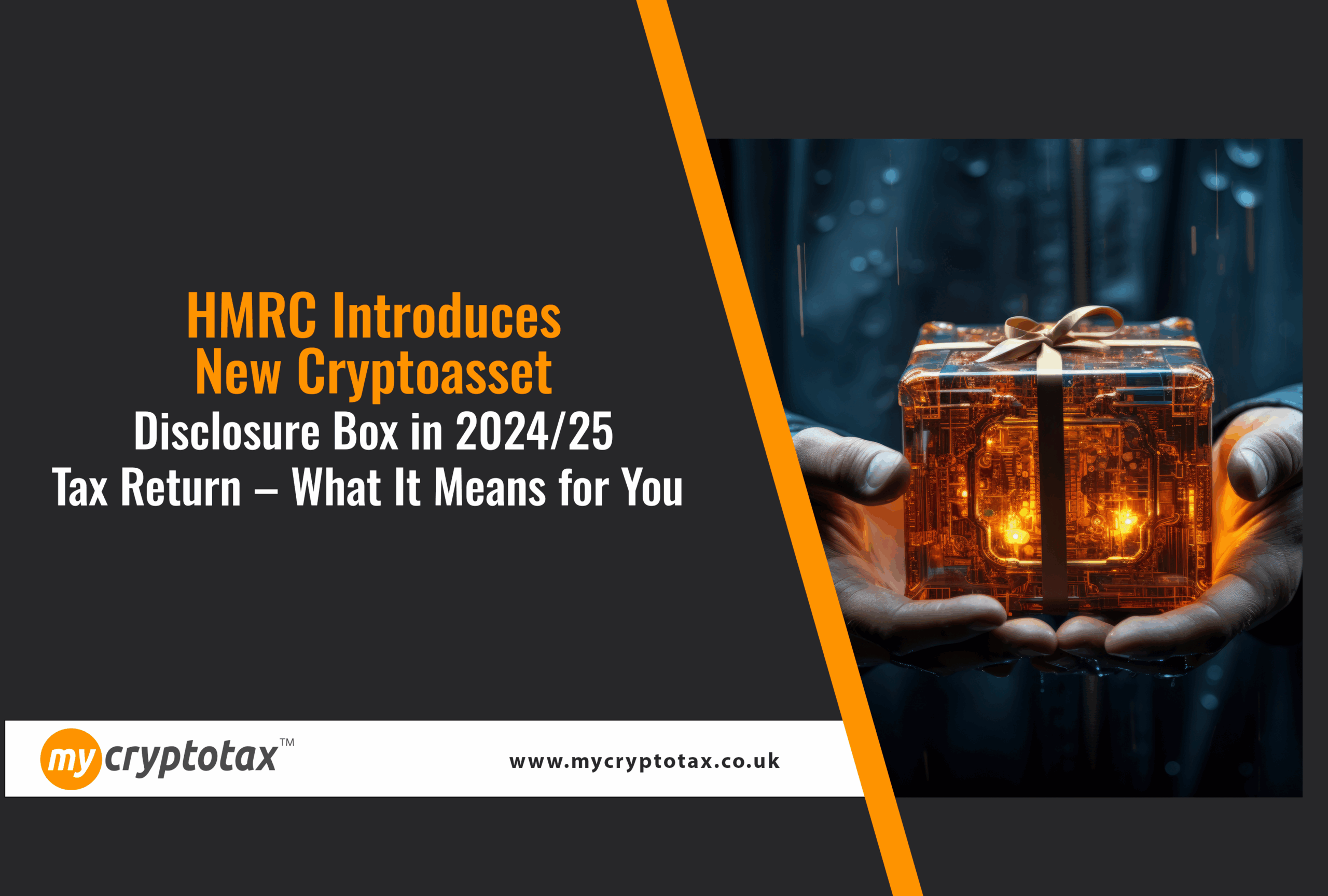HMRC Introduces New Cryptoasset Disclosure Box in 2024/25 Tax Return – What It Means for You

As crypto adoption continues to grow in the UK, HMRC is tightening its focus on cryptoasset tax compliance. From the 2024/25 tax year onwards, the UK Self Assessment Tax Return will include a dedicated section for disclosing cryptoasset transactions — marking a significant shift in the way digital assets are reported.
This change affects millions of taxpayers, especially as HMRC estimates that over 4 million people in the UK now hold cryptoassets. Whether you’re an investor, trader, or even someone who dabbled in crypto briefly, it’s important to understand what this means for your next tax return.
What’s Changing?
The main update is simple but powerful:
From the 2024/25 tax year, taxpayers will see a new “Cryptoasset” question added to the Self Assessment form. This box will appear in four key pages:
- Capital Gains Summary (SA108)
- Self-employment (SA103)
- UK Property (SA105)
- Trusts
If you’ve received or disposed of any cryptoassets during the tax year, you’ll need to tick this box and provide relevant information — including gains, losses, or income generated from those activities.
![[Tags] HMRCs-New-Cryptoasset-Tax-Box-202425-%E2%80%93-What-UK-Crypto-Investors-Must-Know1 HMRC Introduces New Cryptoasset Disclosure Box in 2024/25 Tax Return – What It Means for You](http://mycryptotax.co.uk/wp-content/uploads/2025/04/HMRCs-New-Cryptoasset-Tax-Box-202425-%E2%80%93-What-UK-Crypto-Investors-Must-Know1.jpg)
What Counts as a Cryptoasset Transaction?
HMRC defines cryptoassets broadly. You may be required to report if you’ve done any of the following:
- Bought or sold cryptocurrencies (e.g., Bitcoin, Ethereum)
- Swapped one token for another (e.g., ETH to USDT)
- Used crypto to buy goods or services
- Received crypto through staking, mining, or airdrops
- Earned income or interest through DeFi protocols
- Minted or sold NFTs
Even if you made a loss or didn’t exceed your annual Capital Gains Tax (CGT) allowance, you may still need to report your crypto activity.
Why Is HMRC Making This Change?
The inclusion of a dedicated cryptoasset question is no coincidence. It’s part of HMRC’s broader strategy to:
- Raise awareness among taxpayers that crypto is taxable
- Increase compliance by prompting self-disclosure
- Identify gaps where taxpayers may not be reporting crypto income or gains
This move follows international trends, including the OECD’s Crypto-Asset Reporting Framework (CARF), which encourages governments to enforce stricter reporting standards in the digital asset space.
![[Tags] HMRCs-New-Cryptoasset-Tax-Box-202425-%E2%80%93-What-UK-Crypto-Investors-Must-Know1 HMRC Introduces New Cryptoasset Disclosure Box in 2024/25 Tax Return – What It Means for You](http://mycryptotax.co.uk/wp-content/uploads/2025/04/HMRCs-New-Cryptoasset-Tax-Box-202425-%E2%80%93-What-UK-Crypto-Investors-Must-Know.jpg)
What You Should Do Now
With the new cryptoasset disclosure coming into effect from 6 April 2024, it’s essential to be proactive:
- Start Tracking Your Crypto Activity
Use a crypto tax tracking tool or spreadsheet to maintain detailed records of all transactions — dates, amounts, GBP value, wallet addresses, and platforms used.
- Understand Your Tax Position
Depending on your activity, you may be subject to Capital Gains Tax or Income Tax. For example, selling crypto at a profit usually triggers CGT, while staking rewards may be classed as income.
- Don’t Wait Until January 2026
While the tax return deadline is 31 January 2026, early filing gives you time to claim refunds or plan for any tax owed. If you’re due a refund, you can access it as soon as you file.
- Get Specialist Advice
Crypto tax can get complex — especially with DeFi, NFTs, and token swaps. Working with a specialist accountant ensures full compliance and can help you avoid unexpected tax liabilities.
Final Thoughts
The introduction of a cryptoasset-specific box in the Self Assessment form is a clear message from HMRC: crypto is no longer under the radar.
Whether you’re a seasoned investor or someone who just dabbled in crypto, the safest path is clear — stay informed, keep good records, and make sure your crypto taxes are handled correctly.
If you need support or want to speak with a crypto tax expert, we’re here to help. At MyCryptoTax.co.uk, we specialise in helping UK investors, traders, and businesses stay compliant and tax-efficient in this fast-moving space.
FAQ’s
Do I have to report crypto even if I made a loss or stayed under the CGT threshold?
Yes, HMRC still requires you to disclose your crypto transactions even if you didn’t exceed the Capital Gains Tax (CGT) allowance or made a loss. This helps HMRC maintain accurate records and monitor crypto activity.
How can I prepare for HMRC’s new crypto reporting rules?
Start by keeping detailed records of your crypto transactions — including dates, amounts, values in GBP, and platforms used. Use crypto tax tools or consult a crypto accountant to ensure full compliance and avoid penalties.
![[Tags] HMRCs-New-Cryptoasset-Tax-Box-202425-%E2%80%93-What-UK-Crypto-Investors-Must-Know1 HMRC Introduces New Cryptoasset Disclosure Box in 2024/25 Tax Return – What It Means for You](http://mycryptotax.co.uk/wp-content/uploads/2023/12/1-edited.png)
DISCLAIMER
© My Accountancy Team 2025 All Rights Reserved – The above articles are provided for guidance only and may not cover your personal circumstances so you should not rely on them. It is important that you seek appropriate professional advice which takes into account your personal circumstances where you can provide the full facts of the case and all documents related to your case. My Accountancy Team Ltd t/a mycryptotax.co.uk, cannot be held responsible for the consequences of any action or the consequences of deciding not to act.
![[Tags] HMRCs-New-Cryptoasset-Tax-Box-202425-%E2%80%93-What-UK-Crypto-Investors-Must-Know1 HMRC Introduces New Cryptoasset Disclosure Box in 2024/25 Tax Return – What It Means for You](http://mycryptotax.co.uk/wp-content/uploads/2023/12/2-1-1024x390.jpg)
Do you have a question for our experts?
If there’s cryptocurrency tax issue that has you puzzled or worried, get in touch. Everyone on our team loves to talk, especially when it helps people like you find peace of mind.
Schedule a free consultation with one of our Crypto Tax Experts and get your questions answered fast!
